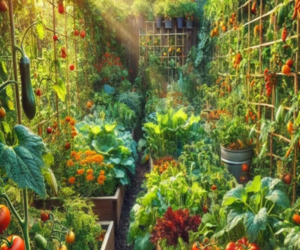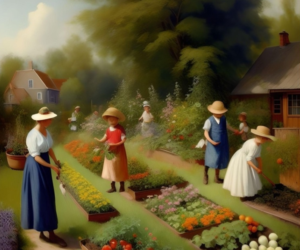

By Ronda L. Caudill
Gardening is more than just a way to put fresh food on the table—it’s a way of life. For me, it’s a source of nourishment, a place of meditation, and a tool for teaching future generations about sustainability. In an era where food is often mass-produced and treated with chemicals, growing a garden is one of the most powerful ways to take control of our health and live harmoniously with nature.
Fresh, Organic Food Right in Our Backyard
One of the most rewarding aspects of gardening is the ability to grow fresh, organic food right in our own backyard. Store-bought produce is often sprayed with pesticides, which have been linked to numerous health concerns. According to the Environmental Working Group (EWG), nearly 70% of non-organic fresh produce sold in the U.S. contains pesticide residues. By growing our own food, we eliminate the need for these harmful chemicals, ensuring that what we consume is truly natural and safe.
Not only is homegrown food healthier, but it also tastes better. Fruits and vegetables that ripen on the vine develop more flavor compared to those picked early for transportation. There’s nothing quite like biting into a sun-warmed tomato straight from the garden or harvesting crisp greens just before dinner.
Gardening Teaches Patience and Adaptability
A garden is a living, evolving space that requires patience and adaptability. Nature doesn’t always cooperate—weather changes, pests arrive, and some plants thrive while others struggle. Gardening teaches us to go with the flow, to learn from setbacks, and to adapt our methods to create the best possible results.
The process of nurturing a plant from seed to harvest instills an appreciation for nature’s rhythms. It reminds us that good things take time and effort. In a world of instant gratification, gardening serves as a grounding practice that encourages mindfulness and perseverance.
A Place for Meditation and Reflection
For me, my garden is more than a place to grow food—it’s a sanctuary. The act of digging in the dirt, pulling weeds, and tending to plants is meditative. Studies show that gardening can reduce stress and anxiety, lower blood pressure, and even decrease symptoms of depression. In fact, research published in the Journal of Health Psychology found that gardening can lower cortisol levels, the hormone responsible for stress.
There’s something deeply satisfying about connecting with the earth, listening to the birds, and feeling the sun on my skin while I work in the soil. It’s a practice that centers me, providing a sense of calm in a busy world.
Teaching Sustainability and Responsibility to Future Generations
Gardens are also classrooms. They offer a hands-on way to teach children the importance of sustainability and responsible stewardship of our environment. Kids who garden learn where their food comes from and gain an understanding of how chemicals, such as pesticides and synthetic fertilizers, harm not just humans but also pollinators, soil health, and water systems. A study by the National Wildlife Federation found that children who spend time in nature, including gardening, are more likely to develop lifelong environmental stewardship. Teaching them to care for a garden fosters respect for the environment and a sense of responsibility toward the planet.
The Importance of Sustainable Gardening Practices
Sustainable gardening is about working with nature, not against it. By using organic compost instead of chemical fertilizers, planting pollinator-friendly flowers, and implementing natural pest control methods, we create a thriving ecosystem that benefits all living things.
According to the United Nations, around 33% of the world’s soil is degraded due to unsustainable agricultural practices. By sustainably growing our own food, we contribute to soil restoration, reduce our carbon footprint, and support biodiversity.
Conclusion
Gardening is more than just growing food—it’s a way to nurture our bodies, minds, and the planet. It teaches us patience, provides a space for meditation, and helps us live in harmony with our environment. Most importantly, it allows us to pass down valuable lessons to the next generation, fostering a deeper connection to nature and a more sustainable future. That’s why I grow a garden.

